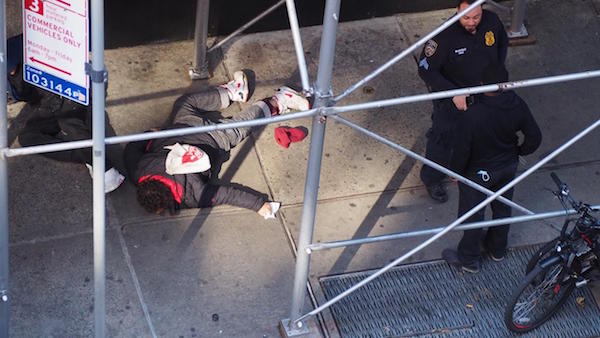
BY WINNIE McCROY | With its many shelters providing resources for at-risk individuals, Midtown Manhattan has long been welcoming to the unhoused. But when the NYC Department of Homeless Services (DHS) compensated for the COVID-19 complications of existing facilities by relocating hundreds of people under their care onto two blocks in the upper West 30s, residents were shocked, then worried, then outraged.
Placed among them in three hotels on W. 36th and 37th Sts. normally occupied by tourists—without consultation, let alone consent—the May 2020 arrival of 800+ men and women with no on-site recreational facilities or social/medical supportive services caused egregious quality-of-life issues. Now, locals and their elected officials are putting their foot down and saying, “Enough is enough.”
But it’s hardly NIMBY-ism (Not in My Backyard). The demand that DHS relocate a third of these men into another shelter comes with the stipulation that their new destination will remain within the confines of Manhattan Community District 4 (MCD4).
“We are not a neighborhood that says ‘No,’ ” said Manhattan Community Board 4 (CB4) Housing, Health, & Human Services (HHHS) Committee Co-Chair Joe Restuccia, in a Sept. 17 HHHS meeting via Zoom call. “We are not a NIMBY neighborhood. That’s never who we have been. However, the concentration and degree and number of people who need serious social services—that is simply not being managed well… leading to a lack of public safety on the streets.”
Lowell Kern, Chair of CB4, said that while they didn’t want to give these individuals the boot, they did need to thin them out a bit, for their own safety as well as that of nearby residents—something CB4 has been asking DHS to do all summer long.
“We were disappointed that DHS never consulted with us in the first place on the use of these hotels, and the problem is that there is too heavy a concentration on the blocks of 36th and 37th Street,” Kern told Chelsea Community News. “So, we asked DHS to work with us to relocate one of the hotel shelters somewhere else within our district. This is not CB4 trying to move homeless people out of our communities. This particular location is a problem because there are too many people there. Three hotels in one block being used as homeless shelters is more than we can handle… and we’d like to move them to another location within our district that would be better for everyone.”
Kern teamed up with Manhattan Borough (BP) President Gale Brewer, New York State Assemblymember Richard Gottfried, and New York State Senator Robert Jackson to send Commissioner Steven Banks, of the NYC Department of Social Services [comprised of DHS and the NYC Human Resources Administration], a four-page request listing DHS actions that would alleviate the problems surrounding temporary shelters in this Midtown corridor. Among the letters goals: the restoration of residents’ quality of life; better coordination with DHS for the operation of local hotel shelters; and a commitment to address the realities of homelessness within the district.
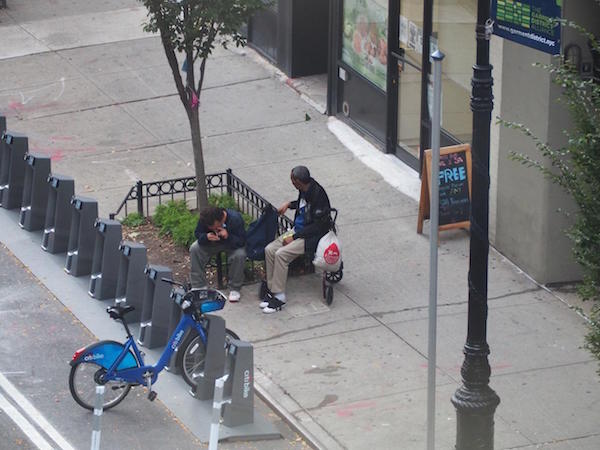
Brewer et. al. noted that their paramount request was a targeted reduction in hotel shelter density on W. 36th St., writing, “As we understand it, at least 2,100 DHS clients have been relocated to seven sites in the district. The density of the transfer has strained the ability of the community to absorb it,” especially at the DoubleTree (341 W. 36th St btw. 8th/9th Aves.) and SpringHill Suites (338 W. 36th St. btw. 8th/9th Aves.).They are asking DHS to shift the residents of one or both to other, more appropriate hotels within MCD4—ones that are able to provide sufficient recreation and programming spaces, as well as social services. They go on to request community input between area residents and local DHS shelters; to demand that temporary hotel shelters have 24-hour experienced security staff; and to work with Bowery Residents’ Committee’s Homeless Outreach Team. In addition, Brewer and others want an explanation of any ways the Hotel Association of New York and City of New York contract has changed or expanded since April 2020, which may have led to the current problems.
Writes Brewer, “There have been numerous reports of physical and verbal assaults, open drug use, public defecation and urination, and a general precipitous decline in quality of life. These conditions have engendered an atmosphere of resistance and hostility to shelter residents and their providers, including the disseminating of false but disturbing rumors about the shelters and their residents. This is a troubling development as residents of MCD4 have historically welcomed properly sited, managed, and sized shelters into their neighborhoods.”
An Increased Police Presence | Locals say Midtown has become an open-air drug market, marred by public urination, defecation, masturbation, drug use, violence, and other crimes. To deal with the exponential growth of drug offenses and other quality-of-life crimes in this corridor, the 10th Precinct had instituted an experimental “Eight for Eight” deployment initiative. For eight weeks, eight members of the 10th Precinct are assigned to a specific area of concern–in this case, the West 30s up to west side of Ninth Ave.–the line of demarcation between the 10th and Midtown South Precincts.
In a Sep. 23 letter to Police Commissioner Dermot Shea, BP Brewer advocated for the continuation of 10th Precinct community engagement strategies created and/or initiated bt recently reassigned Commanding Officer Deputy Inspector Kevin J. Coleman. The focused efforts of Eight for Eight policing, she noted, were needed in the W. 30s because these “pandemic-necessitated hotel shelters have overwhelmed the ability of the local neighborhood to absorb the increased population and their associated social service needs.”
In an Oct. 9 reply to BP Brewer, Commissioner Shea noted staffing shortages “have created deployment challenges for our patrol commands, including the 10th Precinct. ” As a result, the initiative was “modified” and renamed to reflect its number of personnel and length of assignment.
Recalling his Sept. 21 arrival as the 10th Precinct’s new Commanding Officer, Captain Robert Gault noted the Six for Six program “was almost past its end date. In fact,” he told Chelsea Community News on Nov. 12, “the program is long since technically completed. But I quickly determined that if it’s working and the community likes it, there is no need to disband the unit.”
Barring any unforeseen staffing challenges, said Gault, “It will continue in the West 30s, as long as the results are positive and personnel resources permit.l.”
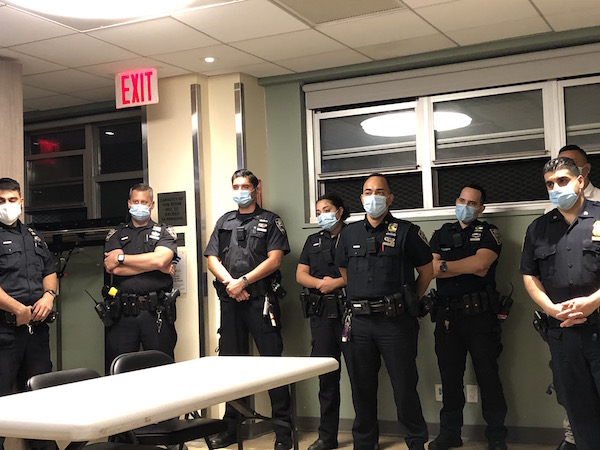
The 10th Precinct is also working with the Center for Court Innovation’s Midtown Community Court to address quality of life issues. They say that so far, the program is working well.
But neighbors say it’s not nearly enough. After busloads of at-risk individuals were ferried to these area hotels with no warning, locals said the streets became full of unwell, unmasked individuals. More than 30 local residents spoke to this in that Sept. 17 CB4 HHHS Zoom call.
With the sounds of sirens in the backdrop, Brian Weber of W. 36th St. said that monthly meetings were not going to change things: “We have to reduce the density here, because 820 individuals on one block, almost eight percent of the City’s relocated homeless population on one block is too much!”
“I can’t express how suddenly the street scene changed since these shelter residents arrived,” echoed Lucy Lieberman, a resident of W. 36th St. btw. Eighth and Ninth Aves. “DHS gave us no information about the specific steps they are taking to remove a shelter, and we want to know the metrics. Will these be here through 2021? We are asking you to remove one or more of these shelters as soon as possible, like this month!”
These “emergency” shelter relocations were not working, said Restuccia. Should other homeless individuals arrive, he warned, “you are not going to hear this polite back and forth.”
Other residents also want the DHS to provide better record-keeping of the number of unhoused relocated south of W. 42nd St. Said Joanne Violante, “I have been a resident of West 37th Street for the past 32 years. I’ve lived through the crack epidemic, the prostitution problems we’ve had, and never has the neighborhood been as deteriorated as it is now. We are overwhelmed. This is untenable, unsafe, and my neighbors are afraid to leave their apartments. It’s heartbreaking to see the tragedy on these streets now.”
DHS Manhattan Borough Director Leilani Irvin said they will comply with the community request for a monthly check-in on the density of these sites.
On Oct. 19, the newly formed Hell’s Kitchen Neighborhood Coalition (HKNC), self-described as a “diverse coalition of Hell’s Kitchen residents, business owners and community members” issued a press release calling on NYC Mayor Bill de Blasio, the DHS, NYPD, and City and State lawmakers “to develop a comprehensive long-term action plan that adequately provides social services for the 1,830 temporary homeless shelter beds added at seven locations in Hell’s Kitchen.”
Elsewhere in the press release, Restuccia (not speaking as a CB4 member) said, “The City has completely abdicated its duty to properly care for residents in these shelters and must stop using COVID-19 as an excuse for continuing a temporary housing plan that doesn’t fully care for our most vulnerable New Yorkers.” HKNC member Restuccia, who also serves as executive director of the Clinton Housing Development Company, a local not-for-profit affordable housing developer, further noted the City has “failed shelter residents, our community and our businesses. Our neighborhood’s ability to come back from the devastation of the COVID-19 pandemic is being threatened as a result.”
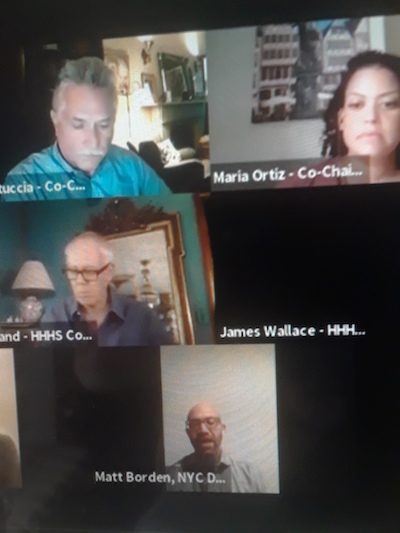
CB4 Letter Details Months of City-Created Dysfunction | On Oct. 7, Kern and HHHS Co-Chairs Restuccia and Maria Ortiz (also a HKNC member) drafted a letter to DHS Commissioner Steven Banks, the NYPD’s Police Commissioner Dermot Shea, and Mayor de Blasio. Sent on Oct. 15 , the 14-page letter—one of the most researched, discussed, and detailed letters ever to be approved by CB4’s full board—establishes early on that the “current density of temporary shelter beds relocated to budget hotels on West 36th and West 37th Streets between 8th and 9th Avenues has created a public safety crisis for the residents of those blocks, the struggling stores and restaurants on 9th Avenue in the West 30s, and the entire Hell’s Kitchen community below West 42nd Street… These blocks were safe prior to the temporary shelter relocation. Today, they are not.”
CB4’s letter enumerates those relocated to MCD4 congregate shelters between May and June [2,142 individuals], and outlines the steps the City needs to take to correct the unintended consequences of the emergency move, and restore safety to the area.
Among these suggested steps are reducing the concentration of clients with the deepest need for social services to shelters that can meet their needs; holding providers accountable; providing dedicated street outreach; and coordinating DHS outreach and NYPD public safety enforcement.
“The current dangerous situation cannot be denied out of existence because it is politically uncomfortable,” reads the letter’s final “Conclusion” section, which goes on to note, “Such action must be developed in consultation with MCD4 and local elected officials as a problem-solving matter, without either political expediency or fear of bad press.”
Many of the calls for change that made it into CB4’s Oct. 15 letter were discussed at the Sept. 17 HHHS meeting, at which committee members quizzed Matt Borden, DHS Assistant Commissioner of Government Affairs and External Relations. Borden said the shelter system had seen an increase in single adults, but was at a six-year low for families.
Asked HHHS member Leslie Williams, “What happens to those people who were in family shelters, whose lives were disrupted?”
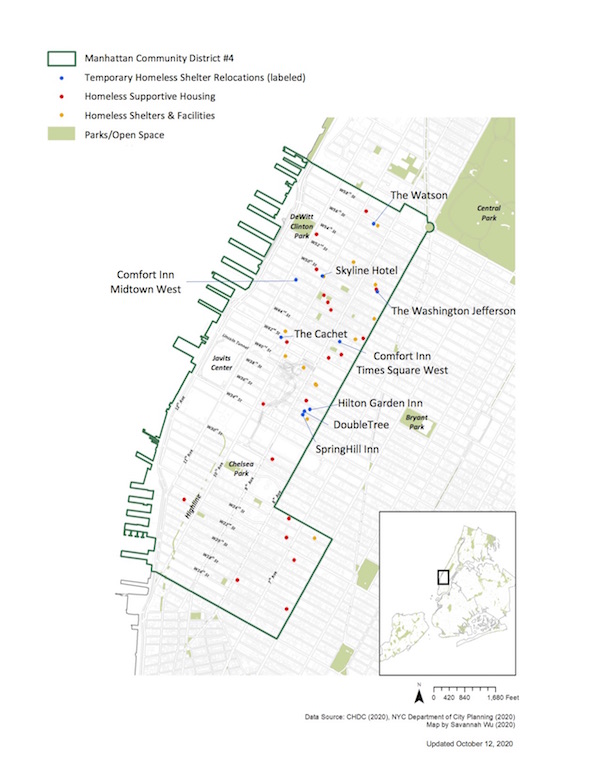
Before shelter families are moved, noted Borden, the DHS looks at where the youngest child attends school, and if they are forced to relocate, will try to keep them within that borough.
“As we have said, our use of commercial hotels to combat COVID is temporary, and as part of our effort to continually review and streamline the footprint of our shelter locations, while always ensuring effective provision of services, we’re beginning to relocate individuals from several commercial hotel locations to alternative non-congregate shelter locations, where we can continue to implement social distancing and provide isolation,” reads a mid-Sept. DHS statement. “With more than 60 commercial hotel locations utilized to combat COVID and protect our clients from this virus over the past nearly six months, these actions will begin to reduce that footprint where we can-and we are continuing to closely monitor health indicators with DOH [NYC Department of Health and Mental Hygiene], to determine when and how all of our clients who are residing in these temporary emergency hotel relocation sites citywide can safely return to shelter.”
COVID-19 Added Fuel to the Fire| COVID-19 has thrown into sharp relief the pre-existing social crisis that was somewhat hidden before, said John Mudd, President of Midtown South Community Council. He said there are ordinarily about 80,000 New Yorkers without housing, including 60,000 sheltered (13,046 homeless families with 19,278 children), as well as about 3,600 living on the streets.
These people have been hit hard by the pandemic. Social services were cut. The sudden dip in foot traffic took away daily cash donations from tourists, office workers, and other passers-by. Similarly, when subways were shut down overnight, the loss of respite provided by MTA stations and subway cars drove many aboveground, underneath sidewalk sheds created by construction, or into the vestibules and doorways of businesses. When these businesses eventually reopened, said Mudd, they weren’t thrilled to see their new “tenants.”
“They are desperate to hang onto their restaurant business, they are angry, and the only thing they can do is punch down at the homeless in the area, who are sleeping on the streets and bothering their customers,” said Mudd, who, glad to hear relocation of Lucerne client to Harmonia had been paused, said, “People need stability. If you uproot them it adds a layer of frustration, because they have to find new social workers and start from scratch.”
Mudd conceded that DHS did a good job keeping COVID-19 infections down, but said ultimately, hotels could not offer adequate services to this population.
“New York City was in the midst of a homelessness crisis when the pandemic hit, and COVID-19 made matters even worse,” said New York City Council Speaker Corey Johnson, whose area of coverage includes Chelsea. “Moving people experiencing homelessness into hotels temporarily was done to help stop the virus spread among this population,” said the Speaker. “My office works every day with stakeholders to address challenges these moves have brought. We support our homeless neighbors, which long-term means creating more supportive housing and more affordable housing.”
Speaker Johnson’s district office is working to expedite the removal of sidewalk sheds along W. 36th St. btw. Eighth and Ninth Aves. They have identified a nearby church that may be able to provide programming, and facilitated a donation from Broadway Cares/Equity Fights AIDS, to help fund recreational and social services.
“There’s no question that our city’s homelessness crisis has been exacerbated by the pandemic and the housing and economic insecurity it has produced, along with the sudden downturn in pedestrian and commuter traffic in Midtown,” said New York State Senator Brad Hoylman, adding, “Nobody in New York City wants to see unhoused New Yorkers treated like chess pieces to be moved around on a whim in the middle of a pandemic.”
Hoylman said Mayor de Blasio must step up and provide homeless services, neighborhood safety, and mental health resources with the same vigor he has used to establish Open Streets.
“These millions of square feet of vacant office space could potentially provide recreational and programming support for those in need,” said Hoylman, adding, “We have a huge need for permanent supportive housing. And we need a real planning process around all of these things, one that happens in consultation with a community rather than behind closed doors.” The guiding principle of our government, asserted Hoylman, ” has to be to do the most good and the least harm. We have a welcoming community in Chelsea and Hell’s Kitchen with a long record of standing up for the vulnerable. We cannot squander that goodwill.”
CB4 HHS Co-Chair Ortiz—a former homeless outreach officer herself—summed it up, saying, “When we talk about this situation, particularly around 36th, 37th Streets, the word ‘challenging’ doesn’t speak to it. It is untenable… I hear you saying sorry, but sorry doesn’t suffice. What the community is going to want to see is action.”
BELOW, PLEASE READ ON, FOR INFORMATION ABOUT A SIMILAR SITUATION ON THE UPPER WEST SIDE
Chelsea Community News is made possible with the help of our awesome advertisers, and the support of our readers. If you like what you see, please consider taking part in our GoFundMe campaign (click here). To make a direct donation, give feedback, or send a Letter to the Editor, email scott@chelseacommunitynews.com.
The History of Homeless Hotels
BY WINNIE McCROY | This issue of relocating DHS unhoused within an area already dense with residents became a matter of public debate and attention-grabbing headlines in July—several weeks after the W. 36th/37th St. situation began—after Upper West Side (UWS) residents reported linked deteriorating street safety and drug activity to temporary shelters in The Hotel Belleclaire, The Lucerne Hotel, and the Belnord Hotel.
In an Aug. 18 letter to DHS Commissioner Banks, Manhattan Borough President Gal Brewer teamed with Uptown officials to address concerns about temporary shelters at those three UWS hotels.
“Our constituents have alerted us, as well as the Administration, to the deteriorating street safety and drug activity in the area, affecting both longtime residents and those temporarily housed in the hotels,” reads the letter.
In addition to expressing the community’s concerns about safety and lack of notification, the letter also noted that some of these sites were inappropriate, with a lack of public programming and recreational space in hotels like the Lucerne, which Brewer said should repair their roof deck for safe recreating. (The same situation exists on W. 36th/37th Sts., the result being many of the 800+ men congesting sidewalks and congregating outside of residential buildings.)
Security issues were an obvious note, with Brewer demanding better collaboration with area NYPD precincts. The letter also asked for outreach workers to address nine problem areas, and to get additional community input.
“The lack of notification to the public that these hotels would be housing the homeless is beyond distressing, and we recommend steps the agency must take now to help mitigate legitimate issues facing the community,” wrote Brewer.
The problem came to a head in mid-September, when a vocal contingent of UWS residents and stakeholders raised $100,000 for a lawyer and threatened to sue to remove the homeless. Then, the Legal Aid Society threatened to sue the City if it transferred these individuals back to dorm-style shelters before it was safe to do so. Mayor Bill de Blasio summarily announced that the 283 homeless men housed at the Lucerne would be moved to the Harmonia Shelter/Hotel Chandler, displacing the disabled homeless families already residing there.
Noting that there were already more than 2,000 at-risk individuals housed in Midtown, elected officials refused, with BP Brewer, New York State Senator Liz Krueger, Assemblymember Gottfried, and NYC Councilmember Keith Powers releasing September statements objecting to moving these individuals to the Harmonia.
“The threat of a lawsuit should not determine a rational decision-making process about the homeless crisis,” wrote Brewer. “The decision to suddenly move the men again makes no more sense than the decision to bring them to the Lucerne without any planning. The Project Renewal staff is now rquired to start over their outreach in a community on E. 31st Street, and as Borough President I will again be involved in facing the issues. At that hotel, DHS is now moving out adult families to still other hotels (family shelters) so that the Project Renewal men can move in. This approach by the City to repeatedly move large numbers of homeless individuals from one site to another cannot be good for clients or communities. We need permanent, supportive housing; we must do better
As Brewer predicted, that problem did indeed rear its head, when Midtown residents instantly objected to yet another group of at-risk individuals being moved to the Harmonia, located in the already-crowded corridor of the mid-30s.
“The Harmonia is a uniquely specialized facility serving a vulnerable population that includes many people with disabilities, including physical and mental health challenges,” wrote elected officials in their Sept. 10 joint statement, adding, “The service provider at Harmonia, Services for the Underserved, spent many months renovating the building and hiring staff to meet the specific needs of their residents, and have built a program that is a model for the City.”
Elected representatives for MCD4 stated that they’d always welcomed shelters into their neighborhood, and that over the past two years, had come to see the residents of the Harmonia as their constituents. They were not willing to accept them “being scattered to the four winds with barely any notice, losing the connections, relationship, and services they have come to rely on at the Harmonia.”
Every community in New York City, they wrote, “must be part of the fight against homelessness. We proudly support housing the homeless in our communities, and we will welcome these new constituents… However, we are deeply disturbed that the Mayor is caving to political pressure to move homeless New Yorkers out of temporary pandemic shelter at the Lucerne Hotel in a way that will displace one hundred fifty adults families sheltered at the Harmonia, none of whom deserve to get caught up in this politicized process.”
Eventually, the Mayor and DHS began to back down from their plans to relocate the residents of the Lucerne to the Harmonia. After a September protest, the Mayor’s plans were scrapped, with Lucerne patrons to be relocated to the Radisson Hotel in the Wall Street area. Those plans were scrapped on Oct. 19, when the shelter residents sued the city, claiming irreparable harm if they were removed from their social and employment programs. A judge temporarily stopped the city from moving these 235 men Downtown for a few more weeks, even as a bus was waiting to take them there. But more than a dozen families have already been moved out of the Harmonia Shelter.
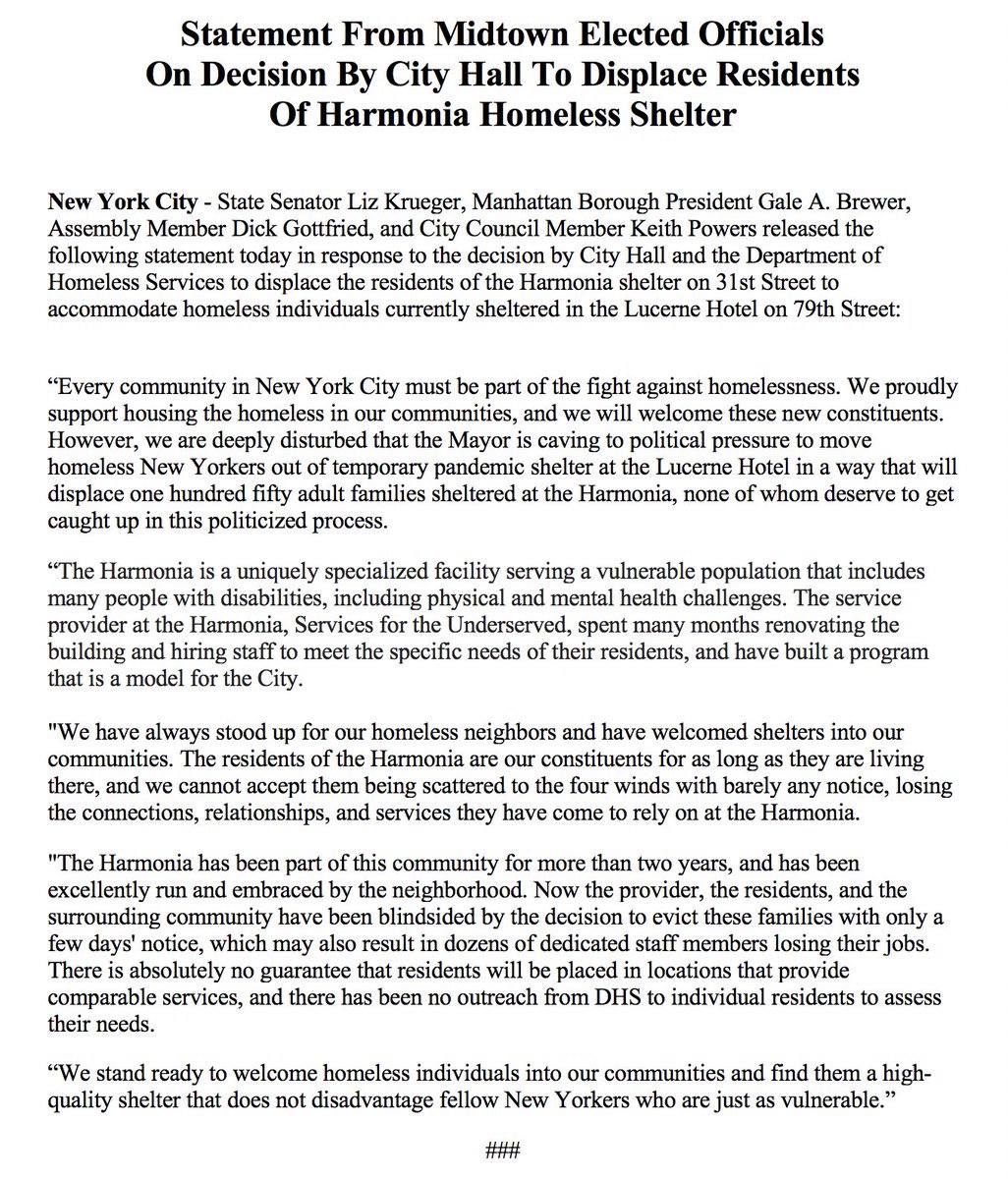
Chelsea Community News is made possible with the help of our awesome advertisers, and the support of our readers. If you like what you see, please consider taking part in our GoFundMe campaign (click here). To make a direct donation, give feedback, or send a Letter to the Editor, email scott@chelseacommunitynews.com.

Pingback: buy weed online
Pingback: Dividend-paying stocks
Pingback: meateater bourbon for sale
Pingback: Johnnie Walker gold label reserve
Pingback: dmt vape carts
Pingback: psilocybin mushrooms for sale online
Pingback: gohighlevel discount
Pingback: Powerful Prayers & Devotional
Pingback: oxynorm fass
Pingback: black dp
Pingback: best muchrooms shop in usa,
Pingback: tchat-cam-gratuit.com
Pingback: click here
Pingback: สล็อตวอเลท ไม่มีขั้นต่ำ
Pingback: slot999
Pingback: เว็บสล็อตใหม่ล่าสุด
Pingback: glock 17
Pingback: dark0de market
Pingback: Recidivist Chelsea Burglar, ID’d as April Stabbing Assailant, Behind Bars as Mental Health Questions Linger – Chelsea Community News